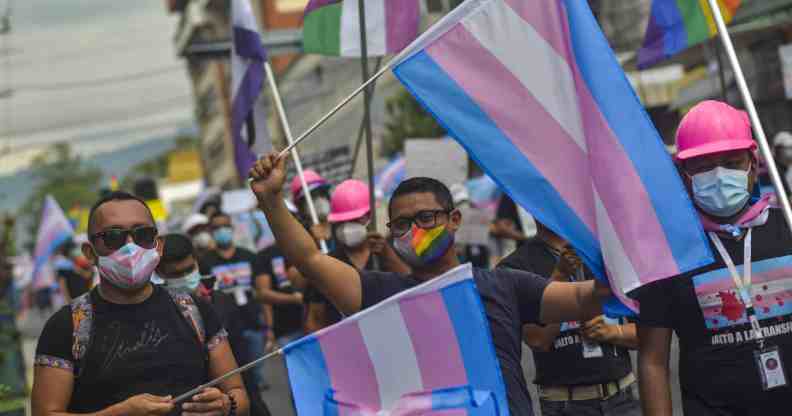El Salvador urged to introduce trans rights reforms and act on historic Supreme Court ruling

Demonstrators hold up flags while chanting slogans during the demonstration.(Photo by Camilo Freedman/SOPA Images/LightRocket via Getty Images)
El Salvador is facing calls to urgently introduce a path to legal gender recognition and protection from discrimination for trans people.
In February 2022, El Salvador’s Supreme Court ruled that the constitution prohibits discrimination based on gender identity, and gave the legislature one year to create a system for trans people to change their names on their identity documents.
To comply with international human rights standards, lawmakers are also being called upon to introduce a a system for gender recognition.
Five months on, with no reforms announced, Human Rights Watch (HRW) has released a report officials to create a “simple, efficient procedure to allow trans people to accurately reflect their self-declared gender identity”.
“El Salvador’s Supreme Court has made patently clear that trans people have a right to their identity,” said Cristian González Cabrera, LGBTQ+ rights researcher at Human Rights Watch, on Monday (18 July).
“Now the Legislative Assembly should comply with the ruling and ensure the rights of trans people.”
In 2019, anti-LGBTQ+ hate crimes in the country reached more than 300, including the murder of 27-year-old trans woman Anahy Miranda Rivas.
Following he killing, trans programme coordinator at COMCAVIS Amalia Leiva told the Washington Blade that “we need support to continue pushing the government.”
COMCAVIS joined HRW for the 40-page report, titled:” We Just Want to Live Our Lives: El Salvador’s Need for Legal Gender Recognition”.
“Without such legislation, trans people will continue to be disadvantaged in society, exacerbated by the generalised violence and discrimination they face in all aspects of life,” Cabrera continued.
In an effort to understand the current societal climate for trans people living in El Salvador, HRW and COMCAVIS interviewed 43 transgender people across the country. They found that discrimination is widespread both on the streets and during day-to-day activities such as job-seeking or health consultation.
“Most trans people interviewed told researchers that they experienced discrimination when they visited public healthcare facilities,” HRW said. “They said that clinic staff exposed them as transgender by calling out their legal names in waiting rooms, subjected them to onerous questioning about their identities, and humiliated and mocked them.”
Lawmakers have previously attempted to introduce gender recognition legislation that would improve trans autonomy in the country, including a draft Gender Identity Law in August 2021.
The draft law would create a legal gender recognition procedure, but it has not yet been discussed by the parliamentary Committee on Women and Gender Equality.
In May 2021, the committee blocked a similar bill from 2018 along with 29 other bills on other subjects, calling them “not in accordance with reality.”

